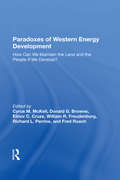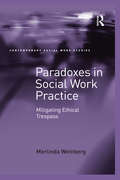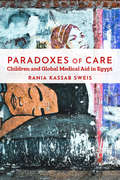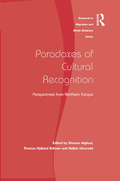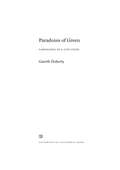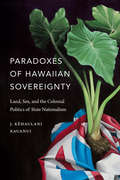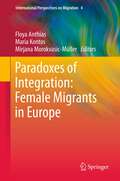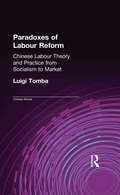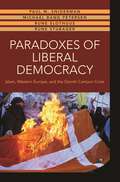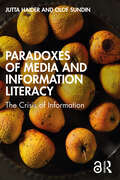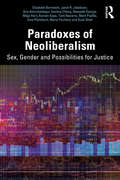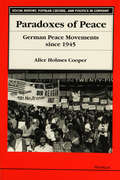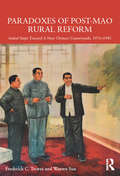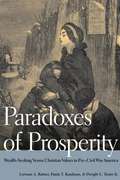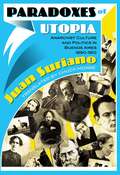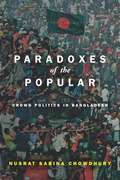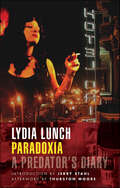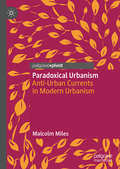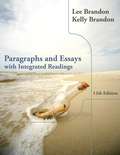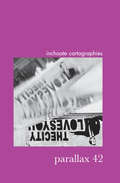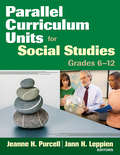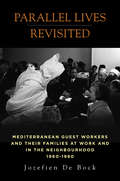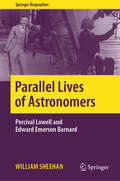- Table View
- List View
Paradoxes Of Western Energy Development: How Can We Maintain The Land And The People If We Develop?
by Cyrus M Mckell Donald G Browne Elinor C. Cruze William R FreudenburgProposed energy resource development in the arid western United States raises a number of potential problems for an environment that does not have a great deal of resiliency. Projected population increases associated with large-scale development activities may go beyond the capacity of small, isolated rural communities to absorb them; and constraints on western agricultural and industrial development—for example, demands for water already exceeding the supply available—also limit energy development. The authors of this wide-ranging book first evaluate western energy resources, then objectively discuss the consequences of development on the region’s physical and social environments. Among the questions they consider are: Who will reap the economic benefits of development, and who will bear the environmental costs? What will be the effects on the environment? The social structure? The quality of life? Are open spaces a national treasure in their present form, or should they be regarded as space available for development? What are the unique demands of reclamation in the arid west? And, given the recent trend of western states-rights militancy and shifts of population to the southwest, what impact will new federal and state policies have on resource management?
Paradoxes in Social Work Practice: Mitigating Ethical Trespass
by Merlinda WeinbergIn the helping professions, codes of ethics and decision-making models have been the primary vehicles for determining what constitutes ethical practice. These strategies are insufficient since they assume that shared meanings exist and that the contradictory universal principles of codes can be reconciled. Also, these tools do not emphasize the significance of context for ethical practice. This book takes a new critical theoretical approach, which involves exploring how social workers construct what is ’ethical’ in their work, especially when they are positioned at the intersection of multiple paradoxes, including that of two opposing responsibilities in society: namely, to care for others but also to prevent others from harm. The book is built on narratives from actual front-line workers and therefore is more applicable and grounded for practitioners and students, offering many suggestions for sound practice. It illustrates that an understanding of ethics differs from worker to worker and is heavily influenced by context, workers’ values, and what they take up as the primary discourses that frame their perceptions of the profession. While recognizing the oppressive potential of social work, the book is rooted in a perspective that ethical practice can contribute to a more socially just society.
Paradoxes of Care: Children and Global Medical Aid in Egypt (Stanford Studies in Middle Eastern and Islamic Societies and Cultures)
by Rania Kassab SweisEach year, billions of dollars are spent on global humanitarian health initiatives. These efforts are intended to care for suffering bodies, especially those of distressed children living in poverty. But as global medical aid can often overlook the local economic and political systems that cause bodily suffering, it can also unintentionally prolong the very conditions that hurt children and undermine local aid givers. Investigating medical humanitarian encounters in Egypt, Paradoxes of Care illustrates how child aid recipients and local aid experts grapple with global aid's shortcomings and its paradoxical outcomes. Rania Kassab Sweis examines how some of the world's largest aid organizations care for vulnerable children in Egypt, focusing on medical efforts with street children and out-of-school village girls. Her in-depth ethnographic study reveals how global medical aid fails to "save" these children according to its stated aims, and often maintains—or produces new—social disparities in children's lives. Foregrounding vulnerable children's responses to medical aid, Sweis moves past the unquestioned benevolence of global health to demonstrate how children must manage their own bodies and lives in the absence of adult care. With this book, she challenges readers to engage with the question of what medical caregivers and donors alike gain from such global humanitarian transactions.
Paradoxes of Cultural Recognition: Perspectives from Northern Europe (Research In Migration And Ethnic Relations Ser.)
by Sharam AlghasiExplicitly comparative in its approach, Paradoxes of Cultural Recognition discusses central issues regarding multiculturalism in today's Europe, based on studies of Norway and the Netherlands. Distinguishing clearly the four social fields of the media, education, the labour market and issues relating to gender, it presents empirical case studies, which offer valuable insights into the nature of majority/minority relationships, whilst raising theoretical questions relevant for further comparisons. With clear comparisons of integration and immigration policies in Europe and engagement with the questions surrounding the need for more culturally sensitive policies, this volume will be of interest to scholars and policy-makers alike.
Paradoxes of Green: Landscapes of a City-State
by Gareth DohertyThis innovative multidisciplinary study considers the concept of green from multiple perspectives—aesthetic, architectural, environmental, political, and social—in the Kingdom of Bahrain, where green has a long and deep history of appearing cooling, productive, and prosperous—a radical contrast to the hot and hostile desert. Although green is often celebrated in cities as a counter to gray urban environments, green has not always been good for cities. Similarly, manifestation of the color green in arid urban environments is often in direct conflict with the practice of green from an environmental point of view. This paradox is at the heart of the book. In arid environments such as Bahrain, the contradiction becomes extreme and even unsustainable. Based on long-term ethnographic fieldwork, Gareth Doherty explores the landscapes of Bahrain, where green represents a plethora of implicit human values and exists in dialectical tension with other culturally and environmentally significant colors and hues. Explicit in his book is the argument that concepts of color and object are mutually defining and thus a discussion about green becomes a discussion about the creation of space and place.
Paradoxes of Hawaiian Sovereignty: Land, Sex, and the Colonial Politics of State Nationalism
by J. Kehaulani KauanuiIn Paradoxes of Hawaiian Sovereignty J. Kēhaulani Kauanui examines contradictions of indigeneity and self-determination in U.S. domestic policy and international law. She theorizes paradoxes in the laws themselves and in nationalist assertions of Hawaiian Kingdom restoration and demands for U.S. deoccupation, which echo colonialist models of governance. Kauanui argues that Hawaiian elites' approaches to reforming and regulating land, gender, and sexuality in the early nineteenth century that paved the way for sovereign recognition of the kingdom complicate contemporary nationalist activism today, which too often includes disavowing the indigeneity of the Kanaka Maoli (Indigenous Hawaiian) people. Problematizing the ways the positing of the Hawaiian Kingdom's continued existence has been accompanied by a denial of U.S. settler colonialism, Kauanui considers possibilities for a decolonial approach to Hawaiian sovereignty that would address the privatization and capitalist development of land and the ongoing legacy of the imposition of heteropatriarchal modes of social relations.
Paradoxes of Integration: Female Migrants in Europe
by Mirjana Morokvasic-Müller Maria Kontos Floya AnthiasThis timely and innovative book analyses the lives of new female migrants in the EU with a focus on the labour market, domestic work, care work and prostitution in particular. It provides a comparative analysis embracing eleven European countries from Northern (UK, Germany, Sweden, France), Southern (Portugal, Spain, Italy, Greece, Cyprus) and Eastern Europe (Poland, Slovenia), i.e. old and new immigration countries as well as old and new market economies. It maps labour market trends, welfare policies, migration laws, patterns of employment, and the working and social conditions of female migrants in different sectors of the labour market, formal and informal. It is particularly concerned with the strategies women use to counter the disadvantages they face. It analyses the ways in which gender hierarchies are intertwined with other social relations of power, providing a gendered and intersectional perspective, drawing on the biographies of migrant women. The book highlights policy relevant issues and tries to uncover some of the contradictory assumptions relating to integration which it treats as a highly normative and problematic concept. It reframes integration in terms of greater equalisation and democratisation (entailed in the parameters of access, participation and belonging), pointing to its transnational and intersectional dimensions.
Paradoxes of Labour Reform: Chinese Labour Theory and Practice from Socialism to Market (Chinese Worlds)
by Luigi TombaLabour reform is only one component of the larger process of reforming economy and society experienced by China over the last three decades. This book uses historical analytical tools in order to shed light on how policymaking takes place in contemporary China: an experimental and self-fulfilling process where decisions are taken only long after being introduced into daily practice. It will be valuable to students of contemporary Chinese society and key to the understanding of 25 years of Chinese labour reform.
Paradoxes of Liberal Democracy: Islam, Western Europe, and the Danish Cartoon Crisis
by Paul M. Sniderman Rune Stubager Michael Bang Petersen Rune SlothuusIn 2005, twelve cartoons mocking the prophet Mohammed appeared in the Danish newspaper Jyllands-Posten, igniting a political firestorm over demands by some Muslims that the claims of their religious faith take precedence over freedom of expression. Given the explosive reaction from Middle Eastern governments, Muslim clerics, and some Danish politicians, the stage was set for a backlash against Muslims in Denmark. But no such backlash occurred.Paradoxes of Liberal Democracy shows how the majority of ordinary Danish citizens provided a solid wall of support for the rights of their country's growing Muslim minority, drawing a sharp distinction between Muslim immigrants and Islamic fundamentalists and supporting the civil rights of Muslim immigrants as fully as those of fellow Danes—for example, Christian fundamentalists. Building on randomized experiments conducted as part of large, nationally representative opinion surveys, Paradoxes of Liberal Democracy also demonstrates how the moral covenant underpinning the welfare state simultaneously promotes equal treatment for some Muslim immigrants and opens the door to discrimination against others.Revealing the strength of Denmark’s commitment to democratic values, Paradoxes of Liberal Democracy underlines the challenges of inclusion but offers hope to those seeking to reconcile the secular values of liberal democracy and the religious faith of Muslim immigrants in Europe.
Paradoxes of Media and Information Literacy: The Crisis of Information
by Jutta Haider Olof SundinParadoxes of Media and Information Literacy contributes to ongoing conversations about control of knowledge and different ways of knowing. It does so by analysing why media and information literacy (MIL) is proposed as a solution for addressing the current information crisis. Questioning why MIL is commonly believed to wield such power, the book throws into sharp relief several paradoxes that are built into common understandings of such literacies. Haider and Sundin take the reader on a journey across different fields of practice, research and policymaking, including librarianship, information studies, teaching and journalism, media and communication and the educational sciences. The authors also consider national information policy proposals and the recommendations of NGOs or international bodies, such as UNESCO and the OECD. Showing that MIL plays an active role in contemporary controversies, such as those on climate change or vaccination, Haider and Sundin argue that such controversies challenge existing notions of fact and ignorance, trust and doubt, and our understanding of information access and information control. The book thus argues for the need to unpack and understand the contradictions forming around these notions in relation to MIL, rather than attempting to arrive at a single, comprehensive definition. Paradoxes of Media and Information Literacy combines careful analytical and conceptual discussions with an in-depth understanding of information practices and of the contemporary information infrastructure. It is essential reading for scholars and students engaged in library and information studies, media and communication, journalism studies and the educational sciences.
Paradoxes of Neoliberalism: Sex, Gender and Possibilities for Justice (Social Justice)
by Janet Jakobsen and Elizabeth BernsteinFrom the rise of far-right regimes to the tumult of the COVID-19 pandemic, recent years have brought global upheaval as well as the sedimentation of longstanding social inequalities. Analyzing the complexities of the current political moment in different geographic regions, this book addresses the paradoxical persistence of neoliberal policies and practices, in order to ground the pursuit of a more just world. Engaging theories of decoloniality, racial capitalism, queer materialism, and social reproduction, this book demonstrates the centrality of sexual politics to neoliberalism, including both social relations and statecraft. Drawing on ethnographic case studies, the authors show that gender and sexuality may be the site for policies like those pertaining to sex trafficking, which bundle together economics and changes to the structure of the state. In other instances, sexual politics are crucial components of policies on issues ranging from the growth of financial services to migration. Tracing the role of sexual politics across different localities and through different political domains, this book delineates the paradoxical assemblage that makes up contemporary neoliberal hegemony. In addition to exploring contemporary social relations of neoliberal governance, exploitation, domination, and exclusion, the authors also consider gender and sexuality as forces that have shaped myriad forms of community-based activism and resistance, including local efforts to pursue new forms of social change. By tracing neoliberal paradoxes across global sites, the book delineates the multiple dimensions of economic and cultural restructuring that have characterized neoliberal regimes and emergent activist responses to them. This innovative analysis of the relationship between gender justice and political economy will appeal to: interdisciplinary scholars in social and cultural studies; legal and political theorists; and the wide range of readers who are concerned with contemporary questions of social justice.
Paradoxes of Peace: German Peace Movements Since 1945 (Social History, Popular Culture, And Politics In Germany)
by Alice Holmes CooperGiven the militarism of the Empire and Nazi Germany, why did postwar West Germany experience massive waves of peace protest in the 1950s, 1960s, and 1980s? How have postwar peace movements shaped German political culture? Will the cultural norms that frown on the use of military force constrain foreign policy in the new, unified, Germany? In Paradoxes of Peace, Alice Holmes Cooper traces the evolution of peace movements in West Germany (1945-90) and in united Germany since 1990. Cooper examines the domestic and international constellations that gave rise to the peace movements, the sources of their multi-faceted ideologies and participants, and their organizational structures and strategies. The author then investigates the peace movement's response to the challenges of the post-Cold War world. Whereas previous work on German peace movements has concentrated on one period of mobilization or on elite security-policy debates, this comprehensive study examines all phases of mobilization since 1945, taking into account the full spectrum of actors, movement organization and strategy, and the broad political, social, and economic environments spawning peace protest. Arguing that theories of resource mobilization, changes in values, and crises of modernity are insufficient to explain peace movements, Paradoxes of Peace tailors a "political process" approach to postwar German movements. It investigates the political opportunities--the changing domestic and international constellation--which most favored peace mobilization since 1945. It examines the process through which the peace movement transformed popular consciousness and created a peace constituency. It analyzes how German peace movements gradually built an indispensable organizational infrastructure autonomous from parties and other social institutions. Cooper argues that the convergence of these factors determined the movement's capacity to mobilize and have political impact and allowed these to grow over time. Alice Holmes Cooper is Assistant Professor of Government, University of Virginia.
Paradoxes of Post-Mao Rural Reform: Initial Steps toward a New Chinese Countryside, 1976-1981
by Warren Sun Frederick C. TeiwesThe decollectivization of Chinese agriculture in the early post-Mao period is widely recognized as a critical part of the overall reform program. But the political process leading to this outcome is poorly understood. A number of approaches have dominated the existing literature: 1) a power/policy struggle between Hua Guofeng’s alleged neo-Maoists and Deng Xiaoping’s reform coalition; 2) the power of the peasants; and 3) the leading role of provincial reformers. The first has no validity, while second and third must be viewed through more complex lenses. This study provides a new interpretation challenging conventional wisdom. Its key finding is that a game changer emerged in spring 1980 at the time Deng replaced Hua as CCP leader, but the significant change in policy was not a product of any clash between these two leaders. Instead, Deng endorsed Zhao Ziyang’s policy initiative that shifted emphasis away from Hua’s pro-peasant policy of increased resources to the countryside, to a pro-state policy that reduced the rural burden on national coffers. To replace the financial resources, policy measures including household farming were implemented with considerable provincial variations. The major unexpected production increases in 1982 confirmed the arrival of decollectivization as the template on the ground. The dynamics of this policy change has never been adequately explained. Paradoxes of Post-Mao Rural Reform offers a deep empirical study of critical developments involving politics from the highest levels in Beijing to China’s villages, and in the process challenges many broader accepted interpretations of the politics of reform. It is essential reading for students and scholars of contemporary Chinese political history.
Paradoxes of PrEP for HIV Prevention
by Morten SkovdalAvailable open access digitally under CC-BY licence. Pre-exposure prophylaxis (PrEP) is a drug taken by HIV-negative people that reduces the risk of getting HIV. Comparing two case studies in Denmark and Zimbabwe, this book demonstrates six paradoxes that users often encounter in navigating their PrEP journey. These paradoxes lead to contentions, uncertainties, dilemmas and ambiguities that need to be carefully and pensively responded to through what the author terms ‘everyday PrEP negotiations’. The social nature and need for such everyday PrEP negotiations help explain why PrEP works for some people and not for others. This book argues that such insight is critical to make PrEP work for more people and to inform social public health responses.
Paradoxes of Prosperity: Wealth Seeking in Pre-Civil War America
by Lorman A. Ratner Dwight L. Teeter Jr. Paula T. KaufmanIn the midst of the United States' immense economic growth in the 1850s, Americans worried about whether the booming agricultural, industrial, and commercial expansion came at the price of cherished American values such as honesty, hard work, and dedication to the common good. Was the nation becoming greedy, selfish, vulgar, and cruel? Was there such a thing as too much prosperity? At the same time, the United States felt the influence of the rise of popular mass-circulation newspapers and magazines and the surge in American book publishing. Concern over living correctly as well as prosperously was commonly discussed by leading authors and journalists, who were now writing for ever-expanding regional and national audiences. Women became more important as authors and editors, giving advice and building huge markets for women readers, with the magazine Godey's Lady's Book and with e expressing women's views about the troubled state of society. Best-selling male writers--including novelist George Lippard, historian George Bancroft, and travel writer Bayard Taylor--were among those adding their voices to concerns about prosperity and morality and about America's place in the world. Writers and publishers discovered that a high moral tone could be exceedingly good for business. The authors of this book examine how popular writers and widely read newspapers, magazines, and books expressed social tensions between prosperity and morality. This study draws on that nationwide conversation through leading mass media, including circulation-leading newspapers, the New York Herald and the New York Tribune, plus prominent newspapers from the South and West, the Richmond Enquirer and the Cincinnati Enquirer. Best-selling magazines aimed at middle-class tastes, Harper's Magazine and the Southern Literary Messenger, added their voices, as did two leading business magazines.
Paradoxes of Utopia
by Juan SurianoAn engaging historical look at fin de siécle Buenos Aires that brings to life the vibrant culture behind one of the world's largest anarchist movements: the radical schools, newspapers, theaters, and social clubs that made revolution a way of life. Cultural history in the best sense, Paradoxes of Utopia explores how a revolutionary ideology was woven into the ordinary lives of tens of thousands of people, creating a complex tapestry of symbols, rituals, and daily practices that supported-and indeed created the possibility of-the Argentine labor movement.Juan Suriano is a professor of social history at the University of Buenos Aires.
Paradoxes of the Popular: Crowd Politics in Bangladesh (South Asia in Motion)
by Nusrat Sabina ChowdhuryFew places are as politically precarious as Bangladesh, even fewer as crowded. Its 57,000 or so square miles are some of the world's most inhabited. Often described as a definitive case of the bankruptcy of postcolonial governance, it is also one of the poorest among the most densely populated nations. In spite of an overriding anxiety of exhaustion, there are a few important caveats to the familiar feelings of despair—a growing economy, and an uneven, yet robust, nationalist sentiment—which, together, generate revealing paradoxes. In this book, Nusrat Sabina Chowdhury offers insight into what she calls "the paradoxes of the popular," or the constitutive contradictions of popular politics. The focus here is on mass protests, long considered the primary medium of meaningful change in this part of the world. Chowdhury writes provocatively about political life in Bangladesh in a rich ethnography that studies some of the most consequential protests of the last decade, spanning both rural and urban Bangladesh. By making the crowd its starting point and analytical locus, this book tacks between multiple sites of public political gatherings and pays attention to the ephemeral and often accidental configurations of the crowd. Ultimately, Chowdhury makes an original case for the crowd as a defining feature and a foundational force of democratic practices in South Asia and beyond.
Paradoxia: A Predator's Diary
by Lydia LunchThe unspeakable sexual confessions of underground legend Lydia Lunch.—Included in Flavorwire’s “An Essential Punk Literature Reading List"“Paradoxia is compelling, exhilarating, and infinitely readable.” —PaperParadoxia contains frank and often shocking confessions. Lydia Lunch relays in graphic detail a predator’s diary, revealing the true psychic repercussions of sexual misadventure. From New York to London to New Orleans, Paradoxia is an uncensored, novelized account of one woman’s assault on the male of the species.
Paradoxical Urbanism: Anti-Urban Currents in Modern Urbanism
by Malcolm MilesModernist urbanism seems progressive, even Utopian: design for a better world through a democratic and humane built environment. But two currents undermine this vision from within: an Arcadianism which turns to a rural idyll as retreat from change and the effects of industrialization; and an instrumentalism by which the humane vision becomes prescriptive and anti-democratic. Malcolm Miles argues that these two currents undermine modernism’s progressive vision. This book examines the roots of modernist urbanism in the seamless, self-contained systems of Cartesian space; and identifies contradictions within modernist urbanism in its instrumentalism and reliance on de-politicised professional expertise. Miles adroitly reviews the postmodern culture of industrial ruinscapes; and posits that if cities are to be places of proximity, diversity, mobility and agency, this will require a move from modernist instrumentalism to a creative and radically democratic co-production of the built environment.
Paragraphs and Essays: With Integrated Readings (12th Edition)
by Kelly Brandon Lee BrandonThis classic text offers comprehensive, proven instruction in developmental writing. Paragraphs and Essays: With Integrated Readings is the higher-level companion to Sentences, Paragraphs, and Beyond in the bestselling two-book Brandon series. Instruction in this text--comprehensive, flexible, and relevant--is predicated on the idea that reading and writing are linked and that good writing is the product of thoughtful and systematic revision.
Parallax: 13.1
by Mark Dawson Eve Kalyva Igor CassarThis book presents themed issues to provoke exploratory, interdisciplinary thinking and response. It provides a forum for a wide spectrum of perspectives on a topical question or concern. The book will be of interest to those working in cultural studies, critical theory, and cultural history.
Parallel Curriculum Units for Social Studies, Grades 6-12
by Dr Jann H. Leppien Dr Jeanne H. PurcellCovering history, geography, and sociology, these sample lessons and units show how to use the Parallel Curriculum Model to provide rigorous learning opportunities for students in social studies.
Parallel Justice for Victims of Crime
by Susan HermanFocuses on justice served for both the offender and the crime. Most are the time where all our attention is directed towards the justice for the victim to the offendor; here it's our obligation to bring the offender to the bar to be questioned, determine whether as law was broken, and if so sanction him/her with the appropriate punishment in accordance of the law broken. What happens after all this is done? Parallel justice is rooted in Justice to the victims, true justice involves seeking to heal the wounds of those who have suffered and those that have violated the law.
Parallel Lives Revisited: Mediterranean Guest Workers and their Families at Work and in the Neighbourhood, 1960-1980
by Jozefien De BockOriginally coined in 2001 in a report on racial tensions in the United Kingdom, the concept of “parallel lives” has become familiar in the European discourse on immigrant integration. There, it refers to what is perceived as the segregation of immigrant populations from the rest of society. However, the historical roots of this presumed segregation are rarely the focus of discussion. Combining quantitative analysis, archival research, and over one hundred oral history interviews, Parallel Lives Revisited explores the lives of immigrants from six Mediterranean countries in a postwar Belgian city to provide a fascinating account of how their experiences of integration have changed at work and in their neighborhoods across two decades.
Parallel Lives of Astronomers: Percival Lowell and Edward Emerson Barnard (Springer Biographies)
by William SheehanUsing the "Parallel Lives" approach adopted by the Greek biographer Plutarch, noted historian of astronomy William Sheehan contrasts the lives and research careers of two famous astronomers, Percival Lowell and Edward Emerson Barnard. Drawing on vast archival materials and hitherto unpublished source materials, Sheehan documents in detail the contributions of these two late 19th and early 20th astronomers. Living at a time when controversies about Mars peaked, when great observatories were being built, and when research increasingly turned away from the Solar System toward the stellar and extra-galactic universe, these observers made spectacular contributions to astronomy. Their work still inspires, and continues in Perseverance rover's explorations of the surface of Mars carrying forward Lowell's dream of showing that Mars may once have been "the abode of life," and in Barnard's pioneering wide-angle photographs of the Milky Way which first showed the sweep, majesty and complexity of the Galaxy. The work of decades of research and writing, Sheehan has produced what is likely to become the definitive work on these two great astronomers. "Parallel Lives marks an important contribution to the history of astronomy. The book is masterful and inventive. William Sheehan could hardly have chosen two more compelling—or contrasting—personalities to analyze in this fascinating dual biography." - David Baron, author of American Eclipse and The Martians, and former Chair in Astrobiology at the Library of Congress. "Sheehan has united scientific acumen, detailed historical research, penetrating insight into character, and narrative virtuosity—and adapted it all to an ancient Greek model—a remarkable achievement!" - Michael Armstrong, Assoc. Prof. Emeritus of Classics, Hobart and William Smith Colleges, Geneva NY William Sheehan's many books include the authoritative biography The Immortal Fire Within: The Life and Work of Edward Emerson Barnard and (with Jim Bell) Discovering Mars: A History of Observation and Exploration of the Red Planet, which has been called the "gold standard of books on Mars" (Michio Kaku).
